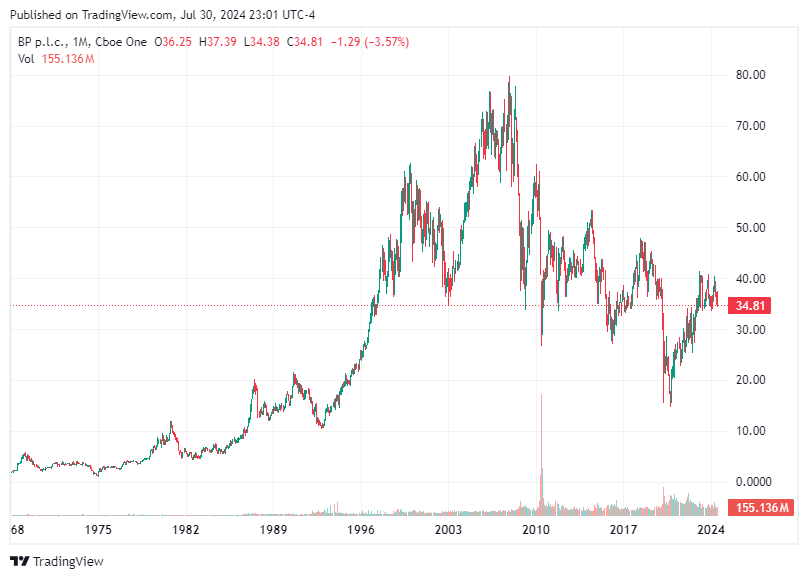London-based Oil-and-gas Giant Surpasses Earnings Expectations
BP Profit Tops Estimates Despite Weaker Refining Margins.

Disclaimer: The following article provides an analysis of BP's second-quarter financial performance for 2024. This content is intended for informational purposes only and does not constitute financial advice. Readers are encouraged to conduct their own research or consult with a professional advisor before making any investment decisions.
Real-time information is available daily at https://stockregion.net
BP, the London-based oil-and-gas giant, has reported its financial results for the second quarter of 2024. Despite facing challenges such as substantially lower refining margins, BP managed to surpass market expectations with its underlying profit.
Q2 Financial Highlights
BP reported an underlying replacement-cost profit of $2.76 billion for the second quarter. This figure is crucial as it excludes exceptional items and any movement in the value of the company’s oil-and-gas inventory, providing a cleaner view of operational performance. This metric is preferred by BP and aligns closely with the net income reported by U.S. oil companies.
Q2 2023: Last year, BP's underlying replacement-cost profit was $2.59 billion.
Market Consensus: Analysts had anticipated a profit of $2.54 billion for Q2 2024.
Despite the lower realized refining margins, BP's strong performance in other areas enabled it to exceed both last year's figures and market expectations. One of the contributors to BP's profitability was its average gas marketing and trading result. The company's ability to effectively market and trade gas helped offset some of the negative impacts from weaker refining margins.
BP experienced lower refining margins during the quarter. Refining margins can be influenced by various factors, including crude oil prices, market demand for refined products, and operating costs. Despite this challenge, BP's diversified operations allowed it to mitigate the impact on overall profitability.
Fuels Margins
Stronger fuels margins provided a buffer against the lower refining margins. BP's strategic focus on optimizing fuel production and distribution contributed positively to its financial performance. Lower taxation also played a role in BP's improved profitability. Efficient tax management and favorable tax conditions in certain jurisdictions helped reduce the overall tax burden.
BP faced $2.8 billion in impairments during the second quarter, which affected its statutory result. Impairments occur when the carrying amount of an asset exceeds its recoverable amount, leading to a reduction in the asset's value on the balance sheet. These impairments can arise from various factors, including changes in market conditions, regulatory developments, or operational challenges. BP's second-quarter performance highlights the importance of a diversified operational strategy. By focusing on various segments such as gas marketing, trading, and fuel margins, BP was able to navigate the complexities of the oil-and-gas industry effectively.
Exceeding market expectations reinforces BP's position as a leading player in the global energy sector. This performance can bolster investor confidence and potentially attract further investments. BP's ability to adapt to market dynamics, manage costs, and optimize its operations will be crucial for sustaining profitability. The company’s strategic initiatives, including investments in renewable energy and efforts to reduce carbon emissions, will also play a role in shaping its future trajectory.
Market Volatility
The oil-and-gas industry is inherently volatile, influenced by factors such as geopolitical tensions, environmental regulations, and fluctuations in supply and demand. BP must remain agile and responsive to these changes to maintain its competitive edge. As the world transitions towards cleaner energy sources, BP faces increasing pressure to reduce its carbon footprint. Balancing profitability with sustainability will be a critical challenge for the company in the coming years. Investing in technological advancements and innovation will be essential for BP to enhance its operational efficiency and explore new opportunities in the evolving energy landscape.
Despite facing lower refining margins, BP's diversified operations and effective management enabled it to surpass market expectations, reporting an underlying replacement-cost profit of $2.76 billion.
Understanding the various factors that contributed to BP's performance, including gas marketing, trading, fuel margins, and taxation, provides valuable insights into the company's operational strengths and areas of focus. Moving forward, BP's ability to adapt to market dynamics, invest in innovation, and balance profitability with sustainability will be pivotal in maintaining its leadership position in the global energy sector.
Disclaimer: This article is intended for informational purposes only and should not be considered as financial advice. The content reflects the author’s analysis based on publicly available information at the time of writing. Readers are encouraged to perform their research or consult a professional advisor before making any investment decisions.
Real-time information is available daily at https://stockregion.net


